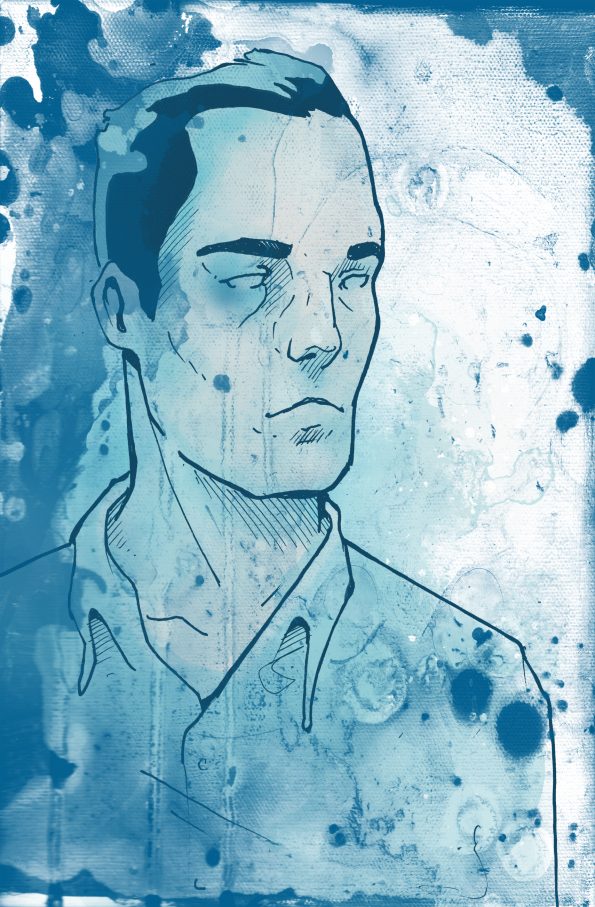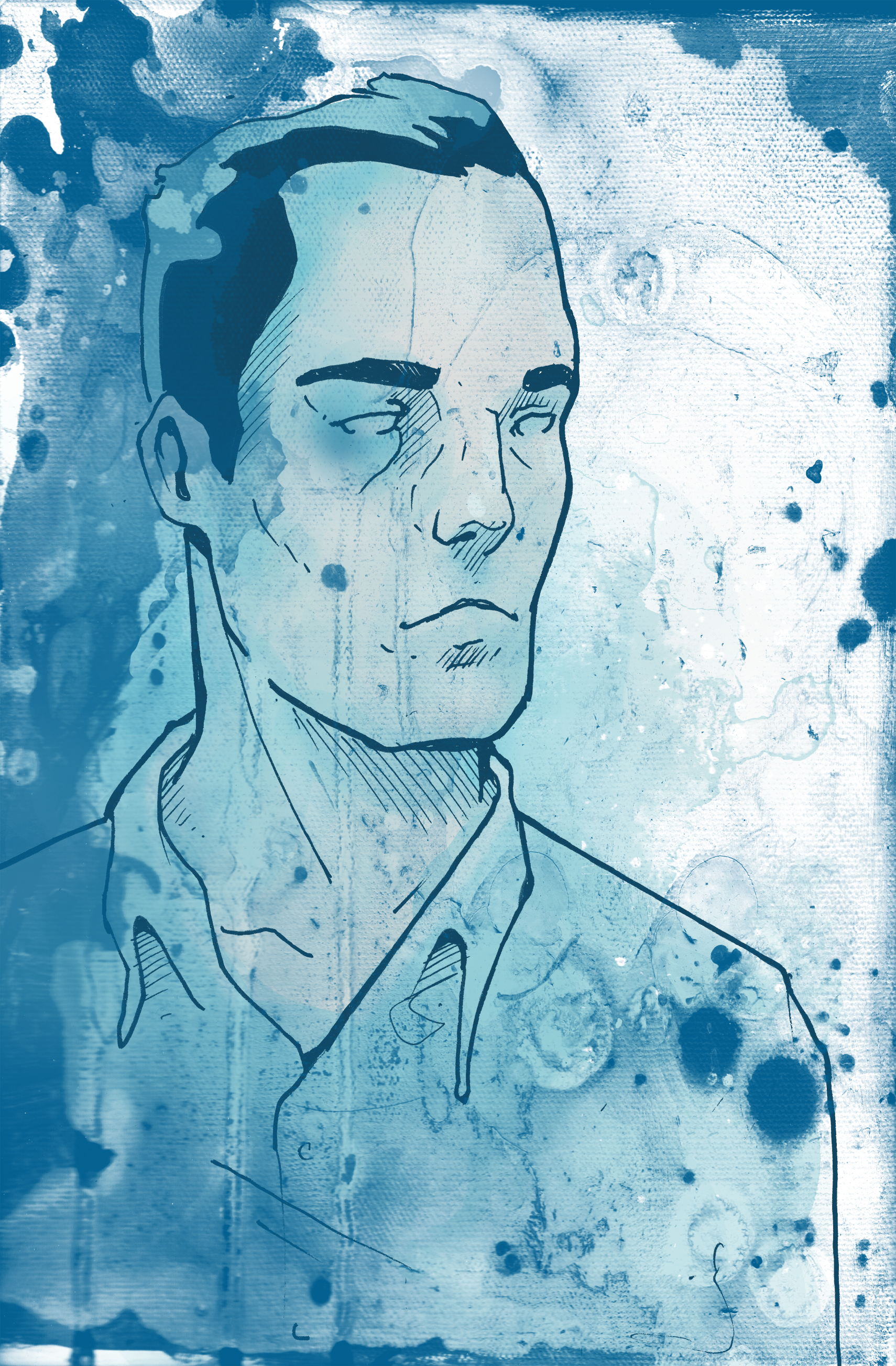
One in four Utah men has experienced physical violence by an intimate partner, according to the National Coalition Against Domestic Violence.
“That’s way too high,” Licensed Clinical Social Worker Steve Eastmond said. “And I would bet it’s something that’s under-reported. That statistic might not even be high enough.”
Daniel and Alexa
Daniel (names have been changed) never expected the beautiful and fun girl he fell in love with would end up physically and psychologically abusing him throughout their marriage.
It wasn’t until their temple wedding night that he had the sickening feeling that something was terribly wrong.
“We were both virgins and Alexa had expected a bigger event, I guess,” he said. “It wasn’t what she expected it to be. She got really angry and threw a fit about it, and accused me of having sex with other girls.”
“I kind of flipped out, thinking, this is supposed to be one of the happiest days of my life and we just had sex for the first time, and here we are arguing,” he said. “It was weird, just weird. I wondered what I had gotten myself into.”
Soon after, the name-calling began. Alexa started calling Daniel stupid, dumbass, and fat, and his family white trash.
“The problem is, I didn’t know that was crazy,” he said. “My whole life, I had never been around anything like this and I didn’t know it wasn’t normal.”
Noah and Natalie
Similarly, Noah was only married a few days when his wife became resentful of their marriage.
“Natalie began acting like I had forced her to marry me,” he said. “And it slowly escalated from there. She had this victim mentality, and she would repeatedly bring up things she felt I had done wrong. It seemed like no matter what I was doing, it wasn’t right. She was always upset. And she would make up things I had said that I hadn’t.”
Noah would try to change things about himself to make her happy, but Natalie would find something else to be upset about. He became anxious about all the things he had to change in himself to avoid arguments.
“I didn’t tell people about the strange behavior because I wanted to protect her, and I thought it maybe was my fault,” Noah said.
From the second week of their marriage and onward once or twice a month, she would bring up ultimatums with the consequence of divorce.
“It didn’t help her case to try to divorce me because I would try to correct everything,” Noah said. “My mentality is, if there is something wrong with what I’m doing, I’m going to change it. I’m not going to be defensive. I wanted to work on this.”
Violence
Daniel and Alexa
The name-calling against Daniel graduated to violence. First, it was hard thumps on the shoulder. Then it got much worse.
“She would get on top of me and just wail on me; she broke my nose once and I had to tell people I had fallen,” he said. “She was so good at blaming me, I thought I was the problem.”
It was four years before he decided to leave the marriage.
“As I was leaving, she was calling me all these names and hitting me,” he said. “She ripped my jacket. It was an awful experience.”
Later that day at work, he received a text from her: she was pregnant.
“I decided to go back home,” he said. “It was awkward at first but then the abuse got worse. I would just take it. At the time, I didn’t think I could call the cops. She said if I did, she would claim I was the one doing it.”
Daniel tried to tell others what was going on. He talked to their bishop, their stake president, their marriage counselor and his best friend. But no one took him seriously.
“Men don’t get abused. That’s the feeling I got from them,” he said.
Noah and Natalie
The psychological abuse against Noah turned violent as well.
“It got to the point where Natalie was swinging at me and hitting me,” he said. “I wouldn’t reciprocate but it seemed like she was looking for a way to blame me for domestic abuse. As a man, it felt like that’s just what I need to expect: that girls can hit men and that’s okay.”
They saw a marriage counselor but the focus was on Noah. “It was just a ‘what Noah is doing wrong’ therapy session.”
By the end of the marriage, Noah regretted seeing and being around Natalie. “It felt like everything was manipulated. I knew I was going to be punished in some psychological or emotional way and still not understand what I had done. But it seemed to give her relief in some way: to blame me, to punish me.”
Divorce
Daniel and Alexa
Daniel came home one day to Alexa moving out while their infant screamed.
They began divorce proceedings and at a friend’s urging, he decided to press domestic violence charges. He gave the police video evidence of her hitting and kicking him and she was charged with one count of domestic violence and one count of domestic violence in front of a minor.
One of the charges was dropped in court, and the other reduced to disorderly conduct. Alexa was sentenced to a fine and two anger management classes.
“I was sitting in court listening to woman after woman with less stuff, less evidence, and the men were getting six months probation and sometimes jail time, and all she got was the fine and a couple classes,” he said. “I don’t believe in the legal system much now. I felt like everyone dropped the ball.”
Noah and Natalie
Natalie insisted she needed a divorce to be able to work through her issues so they could remarry each other on a clean slate.
“I believe in sticking together through the hard times but I didn’t want to force her to be married to me, so I said, if that’s what you need to work through whatever you’re working through, that’s fine,” he said.
Two weeks later, their divorce papers were complete.
They didn’t remarry and Natalie threatens to call the police whenever they disagree.
“If I do everything she tells me to do, there’s peace,” he said. “But if I disagree, she’ll make me pay. Her mentality is that if she can’t control me, I must be out of control.”
Learned Behavior
Daniel and Alexa
Alexa’s grandmother and mother were also abusive to their husbands, Daniel said. Her grandmother screamed and threw things at her husband. Her mother would beat her husband, breaking his foot and other bones. One day, he hit back and received a felony for domestic abuse.
“I was told that this is just how it is in this family,” Daniel said. “And there’s nothing I could do. She’s 130 pounds and looks innocent. I’m 6’1 and 180 pounds. People think men should be able to stand up for themselves. They wonder why a man would let a girl hit you.”
“It’s disappointing that no one had my back at all,” he added. “There’s no support system for men out there. You feel like you’re thrown into a situation and there’s nothing you can do.”
Noah and Natalie
Natalie’s mom was molested by her own grandfather. She became a paranoid and overprotective mother who put down others to build herself up.
“It seemed very codependent, like she kept her kids close in order to have them fulfill something in herself, and she would do it at the expense of her husband,” Noah said. “At first it seems like she really cares that much about her children. But then you notice that if anyone else is nice to the children, or the children are nice to anyone else, she thinks the children don’t love her. It’s like she’s competing with them.”
Similarly, Natalie tries to convince her children she’s the better parent and hates it when they speak positively of Noah.
“She seems to be living with a lot of fear,” he said. “When people do something nice for her, she’ll find something they did wrong and say it’s because they don’t care about her and are trying to hurt her. I understand having self-doubts, but her self-doubts seem so much more extreme.”
The Challenges
Women generally have higher emotional tolerance than men, according to Easton who has had male clients victimized by various forms of abuse in their relationships.
“Men are very emotional creatures, even though they don’t usually consider themselves to be emotional,” he said. “What often happens in any kind of abusive showdown with a woman, the man will end up stonewalling, just saying, ‘whatever, okay, whatever,’ just to get out of further engagement.
“But that kind of abuse can be devastating to a man. And what is he supposed to do? If he yells back, he can be accused of being abusive himself. And yet, she can often get away with it.”
“Men are often worried that if they speak up about the abuse, they will be indicted,” Easton said. “Because she can accuse him of abuse, and there is often an assumption that if there is abuse, it’s the guy’s fault. And because society thinks men ought to be able to handle themselves, it can be very embarrassing to talk about,” he said.
Men in these circumstances tend to downplay what’s happening at home, Easton said. Often in his own practice, abuse has been uncovered only after a couple comes in for communication problems.
“The problem is that it’s not always isolated to the psychological, verbal, emotional or physical abuse. Often, it extends to control of the finances and not allowing them to talk to family or have friends,” he said.
Easton recommends men who are struggling with an abusive relationship seek either a counselor or clergy first for help, instead of the police, unless it’s a very violent situation or involves children.
Additional Help
The ChainBreaker Foundation provides education and assistance for both male and female victims of abuse.
“When someone comes to us for help, we provide a mentor who guides, directs and gives them emotional support while they are trying to figure out what to do with their lives,” the Chainbreaker Foundation Director, Joan Shippen, said. “Part of our program is to help them decide if they are experiencing normal marital discord or domestic abuse.”
Every Tuesday night they hold classes relating to domestic abuse taught by a variety of professionals from around the state.
“I’ve had several men come through the program,” she said. “More and more men are getting brave enough to come. People have a mistaken notion that abuse is all physical or sexual, but it can also involve emotional abuse. Part of abuse is the insatiable need to control somebody else. I call living with that the shredding machine, where you’re just constantly criticized and demeaned. And I think that’s the most damaging of all.”
For more information on the Chainbreaker Foundation, visit www.chainbreakerfoundation.com.






